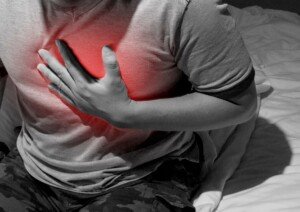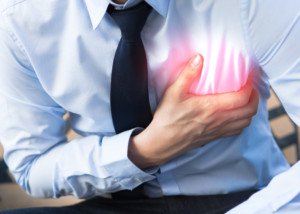
The chest pain from GERD comes in a variety of flavors, and knowing the characteristics of the type of chest pain that acid reflux causes can help set your mind a bit more at ease if you’re always worrying that something is wrong with your heart.
“GERD can have a number of different presentations; one presentation can be that of chest pain,” begins Dr. Brian Lacy, MD, of Dartmouth Hitchcock Med Center, who specializes in functional disorders of the gastrointestinal tract and is author of the book “Healing Heartburn.”
Features of GERD Chest Pain
“This chest pain is typically substernal (under the breast bone), but can radiate up into the neck and even into the left arm,” continues Dr. Lacy.
“This is why many patients, even younger patients, worry that their chest pain represents a heart condition.”
If your symptoms are making you worry about your heart, it’s time to see a cardiologist.
You may be reluctant out of fear of what the doctor will tell you, but remember, many heart conditions can be successfully treated.
Dr. Lacy says, “Once a cardiac source has been ruled out (through any number of tests, including normal EKG, normal echocardiogram, normal stress test), then the substernal pain may be due to GERD.
“The pain is different in different patients. Most commonly, it is described as a burning pain.
“Occasionally it may be described as stabbing; this may be due to a spasm of the esophagus.
“It is rarely throbbing, pulsatile or positional. Positional chest pain is usually due to a musculoskeletal problem.”
Positional chest discomfort that results from acid reflux is relatively uncommon when compared to positional discomfort caused by a musculoskeletal issue.
But it certainly happens often enough such that there are wedge pillows you can purchase online that keep your chest elevated overnight to prevent the backflow of gastric contents up your esophagus.
Positional Chest Pain from GERD and Mechanism of the Chest Pain
“The chest pain may occur in an upright position, especially in the 30-90 minutes after a meal (when a lot of stomach acid is produced to help digest food), or it might occur later, when lying down,” explains Dr. Lacy.
“But this is different in different people. Some may have pain standing up; some lying down.
“It’s not predictable. And it’s trickier, because the chest pain is not always immediately related to acid (although often it is).
“Sometimes acid makes the esophagus sensitive, and then it has a spasm later.
“Or, the acid makes the esophagus sensitive, and they have pain later, without a spasm of the esophagus.
“Plus, some patients have chest pain due to reflux of gastric contents that is not acidic.
“As an example, we have patients with chest pain who take medications for acid reflux, and we know that we have the acid controlled (through pH testing in their esophagus), but they still have chest pain.
“It’s complicated and clearly no one knows the right answer.”
When the Chest Pain Is Severe
Dr. Lacy explains, “One important point to note is that if someone is having severe chest pain, the first thing to determine is ensure that it is not cardiac in origin.”
This can’t be stated too much, especially if you have risk factors for heart disease. Perhaps you’ve always heard, “Anyone can have a heart attack.”
However, there are those who are at very low risk, and those who are at high risk as well as intermediate risk.
You need not have a medical degree to know that the following are giant risk factors for heart disease:
Obesity, excess abdominal fat, lack of structured exercise, smoking, high blood pressure, diabetes, poor cholesterol profile, junk food diet. Being at least 50 doesn’t help either.
“One last point is that if the chest pain improves by belching or burping, it is likely just due to gas in the upper stomach or esophagus.
“As well, if the chest pain resolves by taking an over the counter agent like Mylanta or Maalox or Tums or Rolaids, then it is unlikely to represent a cardiac source.”
 Dr. Lacy combines his love of science, medicine and people to uncover the causes of symptoms like stomach pain, gas, bloating, diarrhea, constipation and regurgitation.
Dr. Lacy combines his love of science, medicine and people to uncover the causes of symptoms like stomach pain, gas, bloating, diarrhea, constipation and regurgitation.
 Lorra Garrick has been covering medical, fitness and cybersecurity topics for many years, having written thousands of articles for print magazines and websites, including as a ghostwriter. She’s also a former ACE-certified personal trainer.
Lorra Garrick has been covering medical, fitness and cybersecurity topics for many years, having written thousands of articles for print magazines and websites, including as a ghostwriter. She’s also a former ACE-certified personal trainer.
.


























